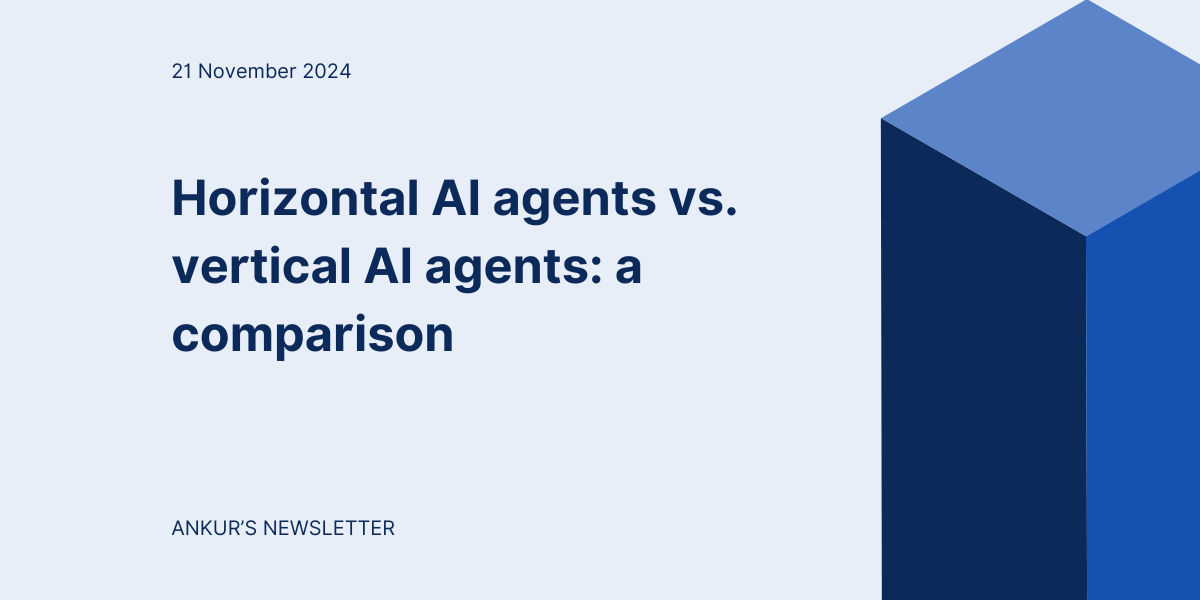|
 |
Horizontal AI agents vs. vertical AI agents: a comparison
Explore the differences between horizontal and vertical AI agents, their enterprise applications, and how to choose the right strategy for your business needs.
Key Takeaways
Horizontal AI agents offer broad applicability across industries with their versatility in handling general tasks, but they may lack the depth needed for specialized industry applications.
Vertical AI agents excel in specific domains by leveraging industry-specific data and expertise, providing more accurate and relevant outputs for complex tasks.
The choice between horizontal and vertical AI agents should align with an organization's strategic objectives, considering factors such as use case complexity, data requirements, and integration needs.
Hybrid approaches that combine horizontal and vertical AI agents can maximize effectiveness by utilizing general capabilities for broad tasks and specialized expertise for domain-specific challenges.
Successful AI implementation requires robust data management, continuous learning, and integration with human expertise to enhance decision-making and operational efficiency.
Last year, I started Multimodal, a Generative AI company that helps organizations automate complex, knowledge-based workflows using AI Agents. Check it out here.
Over the past year, I have been developing AI agents for use in finance and insurance companies. Agentic AI is changing the way we approach workflow automation in several industries, ensuring knowledge work automation like never before. I like to think of them as digital colleagues that can perform complex tasks machines weren’t traditionally good at.
Within AI agents, there are two main types:
Horizontal AI agents
Vertical AI agents
Let’s talk about each of them a bit more, and see where they can be truly useful.
Understanding horizontal and vertical AI agents
Horizontal AI agents
Horizontal AI agents are generalist models, like ChatGPT and Google Bard. They are designed to handle a wide array of tasks across various domains. Their versatility makes them incredibly powerful, but they often lack the depth required for specialized industry applications.
Key characteristics of horizontal AI agents include:
Broad knowledge base covering multiple subjects
Ability to engage in general conversations and perform diverse tasks
Continuous learning from vast amounts of data
While horizontal agents excel at tasks like drafting emails, answering customer queries, and providing general information, they may fall short when it comes to industry-specific nuances or complex workflows.
Vertical AI agents
Vertical AI agents are tailored for specific industries or tasks, offering a deep understanding of domain-specific language, regulations, and workflows.
Key characteristics of vertical AI agents include:
In-depth knowledge of a particular industry or domain
Ability to handle complex, industry-specific tasks with high accuracy
Integration with industry-specific tools and databases
The power of vertical AI agents lies in their ability to drive significant value in specific business contexts. For instance, in law firms, vertical AI agents can analyze complex legal documents, extract critical information, and even assist in case research, significantly improving productivity.
From my experience working with various enterprises, I've observed that vertical AI agents often provide more immediate and tangible ROI. They can be seamlessly integrated into existing workflows, requiring minimal disruption to business operations while offering substantial improvements in efficiency and accuracy.
For complex industries, we'll see an increasing trend towards vertical AI applications. These specialized agents will not only enhance productivity but also enable new business models and drive incremental revenue in ways we're only beginning to imagine.


